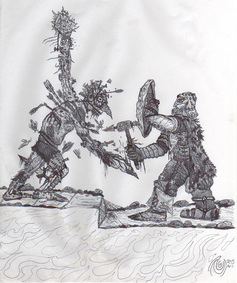 “Writing is a lonely job. Having someone who believes in you makes a lot of difference. They don't have to make speeches. Just believing is usually enough.”
― Stephen King
When you finish a story, who is the first person you ask to read it? When you get a rejection letter, who offers consolation and the encouragement you need to stuff another envelope and send it out again? In short, how strong is your support web?
Writing is by definition a solitary task. But humans are not always suited to be solitary creatures.
While most writers have a personal support system, the people who support us in life are not always the best at supporting us in our writing. It's not always that they don't try, but more likely they just don't have a clue what we really need.
In truth, we are not alone. There are plenty of other writers out there who are likely experiencing something similar in their writing lives as well. It's sometimes difficult to connect with them, but well worth the effort.
Writing circles, critiquing groups, conferences, or a one-on-one writing buddy are all great ways to connect with other writers who can provide support or just talk shop. While our writing is a solitary occupation, our writing lives don't have to be.
Spin a web and reach out to other writers. Build your support system strong and find greater support in reaching your goals.
Telling yourself you don't have time to write today is easy. Telling a writing buddy with a schedule more hectic than yours that you don't have time to write is not as simple. Avoiding that conversation can be great writing motivation.
 'Editors also know that the people who are really readers want to read. They hunger to read. They will forgive a vast number of clumsinesses and scamped work of every sort if the author will delight them just enough to keep them able to continue.'
-William Sloane
We all labor over our manuscripts with great care and diligence. We become captivated by our charactors and creatures; the tale we have conceived and given birth to; the story we have nurtured and developed and poured countless hours of our lives into. When it's finally done, and we have shed our tears of joy and sadness, we prepare to send it out into the world. But before we reach for that envelope - or in todays world, the submit button - we should all take a moment to stop and be sure we have done all we can to give our work the best possible chance of success when it must ultimately stand on its own.
I think we all fear that moment when our work leaves our hands, venturing out to find out if it can stand alone or not. In completing the manuscript, we complete a chapter of our writing lives.
Seven Circles is complete - almost. While it is for all practical purposes done, I can't help but feel it's just not finished. I can't put my finger on just what it is about the manuscript that is bothering me, I also can't get over the feeling that something about it is not quite right.
I wonder if it's just pre-submittal butterflies, or something real and substantial. While I dread doing yet another editing pass, I'm not comfortable submitting something that is sub-par in quality. It's the perfectionist curse I carry around within me. Or maybe it's just the writer in me fearing the possible rejection letter. Either way I'm in a vicious avoidance circle with my inner writer. It's frustrating as hell and I have got to break it soon.
So will I break down and send it out, or will I give in and open it back up?
Your guess is as good as mine at this point. I'll keep you updated.
 "I wish you a wrestling match with your Creative Muse that will last a lifetime. I wish craziness and foolishness and madness upon you. May you live with hysteria, and out of it make fine stories — science fiction or otherwise. Which finally means, may you be in love every day for the next 20,000 days. And out of that love, remake a world.”
― Ray Bradbury
It's a New Year once again and people are thinking about resolutions. I'm not, but some people are.
Instead of a resolution, I want to make a wish. Not just for me, but for every writer out there in the world, regardless of whether they are just beginning or have been writing for years and years:
Just as Bradbury did - I wish you madness (and all the writing bliss that accompanies it).
Write often and have a safe and happy holiday.
 You can't wait for inspiration. You have to go after it with a club.
- Jack London
Inspiration doesn't keep to a schedule in my house. It doesn't visit regularly or even call ahead to alert me when it's coming. When it does arrive, always unannounced, I never know if it will stay a few hours or a few weeks. Sometimes it doesn't call for days on end. These are the days when I think about this quote. I go to the closet in my office and dig out my assortment of maces and baseball bats.
Okay, that's not entirely true. I keep my hunting weapons on the book shelf behind my desk. Instead of sticks and clubs though, my weapons of choice for hunting inspiration - surprise, surprise - are special books. Not ordinary books, but journals. I've been keeping them for years for just such occasions.
In these journals I've recorded all the places where inspiration has appeared to me in the past. I allow in them a certain freedom that I generally deny myself in my story writing. Among these pages I give Chaos free reign. The journals hold everything imaginable, from the mundane day to day things to sketches, lists and story notions. There is no order and I make no attempts to impose any. Thoughts fall upon the pages just as they emerge from my mind. Anything I find interesting or strange or helpful, I record in these books. As a result, I have yet to come back from a hunting expedition empty handed.
Currently I have six journals. I did make an attempt once to segregate the contents for easier retrieval, but it failed miserably and I've never tried it again. What I record in each book tends to have much more to do with which one is handiest when a thought occurs to me than putting the thought into a specific place or volume.
One stays by the bed, most of the time. Another is carried with me whenever I go anywhere. One stays on the floor under my recliner. Yet another wanders around the house almost as much as I do. The other two no longer have blank pages, and therefore can almost always be found in my office, on the shelf behind my desk. (On the same shelf, there are also three completely blank books for future use. I buy them ahead so that I have them on hand for occasions when I deserve a reward.)
While I don't impose order, I do try to date the entries and give them headings. Currently the pages contain heading like:
List
Quote to Remember
Story Notion
Science Fact
Craft Note
Journal Entry
Plot Line Idea
Character Profile
Blog Post Idea
Strange Thought
This is just a partial list. The contents evolve just as my thoughts do.
While keeping a journal is nothing new, especially for a writer, I can't think of a single thing that has helped improve my writing more than these volumes. They balance out the days when I have a thousand ideas with the days I have none at all.
The point of this Post?
Know that there are days when writing will be easy and days when it will not. Prepare for those days. Keep a few clubs close at hand.
 The big secret is the ability to stay in the room. — Ron Carlson
There are days when staying in the room is indeed the most difficult part of writing. Life pounds on the door; thoughts scurry about in opposing directions; responsibilities shout through the walls, reminding us of forgotten or postponed duties; Imagination sits on a chair in the corner and laughs hysterically without muttering a word. It's difficult to shut out the distractions and simply concentrate on the writing.
But some days it isn't staying in the room that's difficult. For me getting into the room tends to be the hardest part.
I have an office. Once I sit down in it, writing becomes easier. It's noting fancy, just a spare bedroom that is no longer being used for sleeping. The desk is a very old table I bought at an auction. The chair was a Christmas present. I have several book shelves that my father gave me when he cleaned out his garage. They hold a mish-mash of reference and science fiction books, along with some classics. There are also old magazines, a set of encyclopedias, and way too many office supplies. The room doesn't look like much, but it's comfortable and it's conducive to writing. The biggest problem I have is walking up the stairs to get to it.
For years I dreamed of having a designated writing space; of being able to have a room completely dedicate to the sole task of creating. Over the years, I've written in the dining room, the living room, the bed room, the front porch, and occasionally the back yard and the car. It's difficult to stay focused when all the distractions of life are neatly displayed no matter where your gaze falls.The office was to be my sanctuary, my place to escape the world and all of the things in it that steal away bits of my attention and inspiration. This designated room minimizes those effects.
But going there, and sitting down in that chair, is sometimes more difficult than any other aspect of writing. It's like the creative monster in my mind dreads that place of order and business. The lack of non-writing related chew toys is frightening for a monster of such mythical proportions as my often maddening beast and muse, Chaos. It fights entering the room like the dog fights my attempts to put him in the bathtub. I try to make it an inviting place, but that isn't always enough. Chaos is very smart. The room means it's time to work. Monsters don't always like to work. At least my monster doesn't like to sometimes. There are claw marks on the door frame to prove it.
But writing isn't an occupation for the faint of heart. It's an obsession fueled by passion and commitment. It's a frame of mind that requires time and effort and sometimes a whip and a chair.
But when all else fails, it helps that I keep a big bowl of candy on my desk.
 “It's hard for me to believe that people who read very little - or not at all in some cases - should presume to write and expect people to like what they have written. Can I be blunt on this subject? If you don't have time to read, you don't have the time - or the tools - to write. Simple as that.”
- Stephen King
The best advice I have ever received on writing was also the simplest: READ.
Read anything and everything. Read novels and short stories; read newspapers and magazines; read non-fiction and fiction; read poetry, plays, song lyrics, joke books, billboards. Read classic literature, pulp fiction, and the manual to your newest electronic device. Read. It doesn’t matter if what you read is well written or crap. There is something to be learned from all of it.
Like any trade, writers need tools to practice their craft. Rather than hammers and saws or wrenches and screwdrivers, we use tools such as vocabulary, punctuation, and sentence structure. While these are things we begin to acquire as very small children, it can take a lifetime of study and practice to use them well. I like to think of reading as part of a writer’s apprenticeship. The more I read the more I learn about writing. Even more importantly, the more I read the more I understand about writing.
Here’s another analogy, not because I think you don’t understand, but because I enjoy writing analogies. They’re fun.
Reading is like going to the grocery store to stock the pantry in your kitchen. If you want to prepare a great meal, then you probably want to stock items from more than one department in the store. With writing though, the ingredients you buy don’t ever spoil. They may need refreshed from time to time, but once you buy them, you generally keep them for all of your life. The more you read, the more items you are putting into your writing pantry. The more writing ingredients you have, the tastier the meals you can prepare for your readers.
Reading expands vocabulary and imagination; it entertains and informs; it takes us outside of our individual world and shows us what does or could lie beyond the limits of ourselves. Good writing shows me how to do things right or better, while bad writing teaches me what to avoid. Non-fiction informs me and Fiction opens doors in my imagination that I may not have been previously aware of. I learn something from everything I read, even when I’m not trying to. I can’t help it.
I’ve gotten story ideas from advertisements and magazine articles; I’ve done research in biographies and encyclopedias; I learned how to better pace my stories by reading poetry. The amazing thing is, I don’t know I’m learning these things until I sit down to write. It’s then that the rewards are reaped.
So if you want to write, you need to read. Simple as that.
|






 RSS Feed
RSS Feed